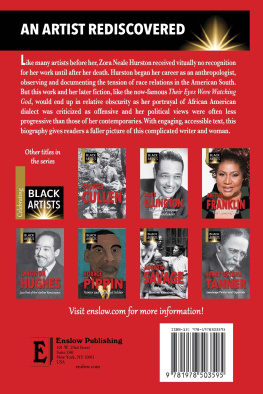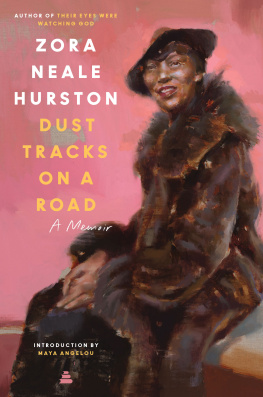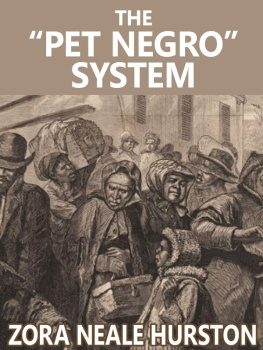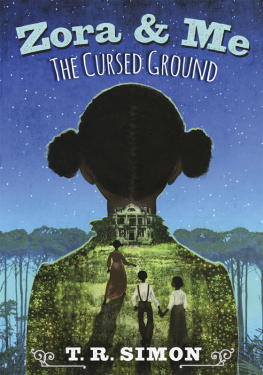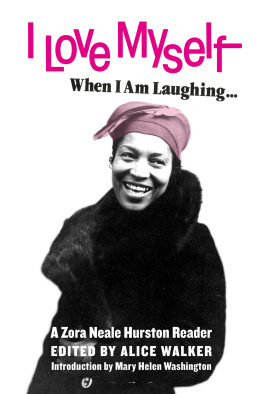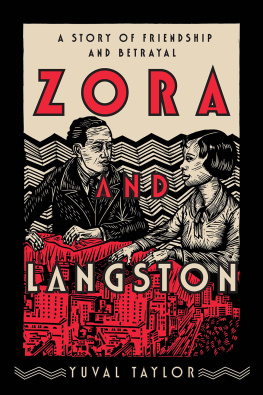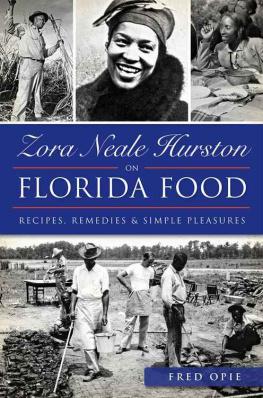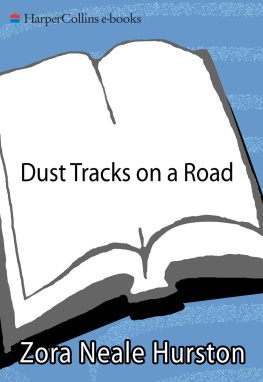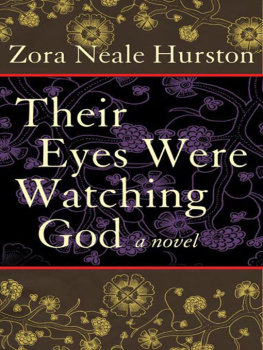STUDIES IN
AFRICAN AMERICAN HISTORY AND CULTURE
edited by
GRAHAM RUSSELL HODGES
COLGATE UNIVERSITY
THE ASSERTIVE WOMAN IN ZORA NEALE HURSTONS FICTION, FOLKLORE, AND DRAMA
___________________
PEARLIE MAE FISHER PETERS
First published 1998 Garland Publishing Inc.
Published 2016 by Routledge
2 Park Square, Milton Park, Abingdon, Oxon OX14 4RN
711 Third Avenue, New York, NY 10017, USA
Copyright 1998 Pearlie Mae Fisher Peters
All rights reserved. No part of this book may be reprinted or reproduced or utilised in any form or by any electronic, mechanical, or other means, now known or hereafter invented, including photocopying and recording, or in any information storage or retrieval system, without permission in writing from the publishers.
Notice:
Product or corporate names may be trademarks or registered trademarks, and are used only for identification and explanation without intent to infringe.
Credits and acknowledgments borrowed from other sources and reproduced, with permission, in this textbook appear on appropriate page within text.
ISBN: 9780815328889 (hbk)
Library of Congress Cataloging-in-Publication Data
Peters, Pearlie Mae Fisher, 1947.
The assertive woman in Zora Neale Hurstons fiction, folklore, and drama / Pearlie Mae Fisher Peters.
p. cm. (Studies in African American history and culture)
Includes bibliographical references and index.
ISBN 0-8153-2888-5 (alk. paper)
1. Hurston, Zora NealeCharactersWomen. 2. Feminism and literatureUnited StatesHistory20th century. 3. Women and literatureUnited StatesHistory20th century.
4. Assertiveness (Psychology) in literature. 5. Afro-American women in literature. 6. WomenUnited StatesFolklore. 7. Afro-Americans in literature. 8. Afro-AmericansFolklore. 9. Women in literature. I. Title. II. Series.
PS3515.U789Z8 1998
813.52dc21
97-38425
This book is dedicated to Boley, Charles Etta, Dexter, Maurice,
Lucille, Johnetta, Betty, Charles, Ralph, John, Herbert,
William C. Fischer, Lyle Glazier and Bruce Jackson.
And to Zora Neale Hurston wherever she may be lurking and
sharpening her own oyster knife without fear and tears
in the cosmos
Contents
Grateful copyright acknowledgment is extended to the following sources: Harper Collins Publishers for permission to reprint excerpts as submitted from Their Eyes Were Watching God by Zora Neale Hurston. Copyright 1937 by Harper & Row, Publishers, Inc. Renewed 1965 by John? Hurston and Joel Hurston. Reprinted by permission of Harper Collins Publishers, Inc.; excerpts from various stories as taken from The Complete Stories by Zora Neale Hurston. Introduction copyright 1995 by Henry Louis Gates, Jr. and Sieglinde Lemke. Compilation copyright 1995 by Vivian Bowden, Lois J. Hurston Gaston, Clifford Hurston, Lucy Ann Hurston, Winifred Hurston Clark, Zora Mack Goins, Edgar Hurston, Sr., and Barbara Hurston Lewis. Afterword and Bibliography copyright 1995 by Henry Louis Gates. John Redding Goes to Sea originally published in Stylus, May, 1921, and was reprinted in Opportunity, January, 1926. Spunk was originally published in Opportunity, August, 1926. Sweat was originally published in Fire, November, 1926. The Gilded Six-Bits was originally published in Story, August, 1933. Uncle Monday and Motherine Catherine were originally published in Negro: An Anthology, collected and edited by Nancy Cunard, published by Wishart in 1934. Copyright 1934 by Zora Neale Hurston. Story in Harlem Slang was originally published in The Southern Literary Messenger, July, 1942. The Conscience of the Court was originally published in The Saturday Evening Post, March 18, 1950; Color Struck: A Play was originally published in Fire!!, 1 (November, 1926); excerpts from Mules and Men by Zora Neale Hurston, copyright 1935 by Zora Neale Hurston. Copyright renewed 1963 by John C. Hurston and Joel Hurston. Reprinted by permission of Harper Collins Publishers, Inc.; excerpts as submitted from Jonahs Gourd Vine by Zora Neale Hurston. Copyright 1934 by Zora Neale Hurston. Copyright renewed 1962 by John C. Hurston. Reprinted by permission of Harper Collins Publishers, Inc.; excerpts from Mule Bone by Langston Hughes and Zora Neale Hurston. Copyrigt 1931 by Langston Hughes and Zora Neale Hurston. Copyright renewed 1991 by George Houston Bass and Henry Louis Gates Jr. Reprinted by permission of Harper Collins Publishers, Inc.; excerpts as submitted from Dust Tracks on a Road by Zora Neale Hurston. Copyright 1942 by Zora Neale Hurston. Copyright renewed 1970 by John C. Hurston. Reprinted by permission of Harper Collins Publishers, Inc.; excerpts from Tell My Horse by Zora Neale Hurston. Copyright 1938 by Zora Neale Hurston. Copyright renewed 1966 by Joel Hurston and John C. Hurston.; excerpts from Moses, Man of the Mountain by Zora Neale Hurston. Copyright 1939 by Zora Neale Hurston. Copyright renewed 1967 by John C. Hurston and Joel Hurston. Polk County: A Comedy of Negro Life on a Sawmill Camp. Play in three acts written with Dorothy Waring, 1944. Reprinted with the kind permission of the estate of Zora Neale Hurston. Excerpt from The Color Purple, copyright 1980 by Alice Walker, reprinted by permission of Harcourt Brace & Company. Excerpt by Roger Abrahams reproduced by permission of the American Anthropological Association from Journal of American Folklore 88:347, January-March, 1975. Not for further reproduction. Excerpt from Invisible Man by Ralph Ellison. Copyright 1952 by Ralph Ellison. Vintage Book, March, 1989 Edition by Random House, Inc. Excerpt from Recent Books by Ernest Kaiser in Freedomways, Second Quarter 1978 reprinted with the permission of Ester Jackson, Managing Editor, Freedomways. Reprinted by permission of the Modern Language Association an excerpt from Are You a Flying Lark or a Setting Dove? by Robert Hemenway in Afro-American Literature: The Reconstruction of Instruction, edited by Dexter Fisher and Robert Stepto, 1979. Excerpts from Seraph on the Suwanee, Scribners 1948. Reprinted with the kind permission of the estate of Zora Neale Hurston.
Special thanks are extended to Rider University for its generous support of my research and scholarship projects with a sabbatical and summer research fellowships.
Gracious appreciation with bountiful gratitude is echoed to Kristi Long, Rebecca Wipfler, Alan Brown, and Graham Hodges.
As individual, writer, and socio-political spokeswoman, Zora Neale Hurston was one of the most assertive voices of her time. In personal demeanor as well as in professional and artistic deportment, she was a loud voice to be heard and reckoned with by her intellectual peers and by other social acquaintances. Her creative talent, or natural skill at talking, at articulating her views in a confident and bold voice, was the key element in her early rise as a successful anthropologist and literary artist. On the verbal turf, she was free-spirited and existed with the contention that she had the law of authority in her mouth as she aspired to jump at the sun in the fulfillment of her ambition and natural drive to succeed and to make something of herself. She had no reservations about either expressing her naturally Southern and folk-spirited self, or of articulating her unorthodox views on such touchy subjects as race, integration, the separate-but-equal doctrine of Jim Crowism, marriage and careless love, historical Black colleges, politics and voting rights, no matter how controversial or absurd they may have sounded to her staunchest critics.



